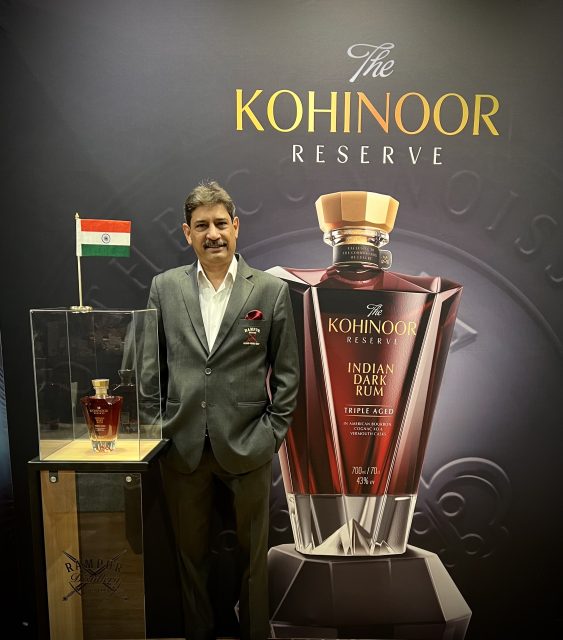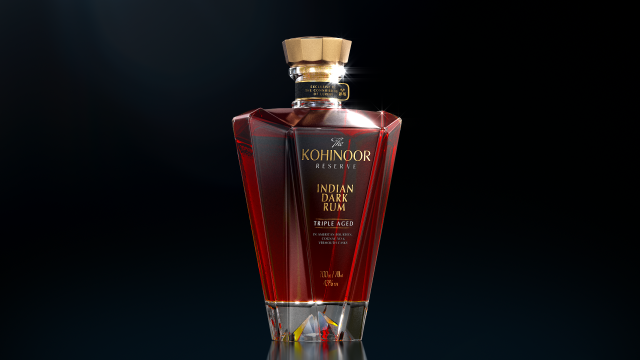This website uses cookies so that we can provide you with the best user experience possible. Cookie information is stored in your browser and performs functions such as recognising you when you return to our website and helping our team to understand which sections of the website you find most interesting and useful.
Q&A: Radico Khaitan’s bid to put Indian rum on the map
Renuka Kennedy speaks to Sanjeev Banga, Radico Khaitan’s president of international business, about why rum deserved to be considered one of India’s hottest spirits.

What sets the recently-released Kohinoor Reserve Indian Dark Rum apart from other Indian rums?
Foremost, the liquid and then the packaging make Kohinoor Reserve Indian Dark Rum unique. It is crafted through small-batch distillation, using only fresh cane juice during the North Indian winter. The Rum is then matured in American oak barrels previously used for maturing Rampur Indian Single Malt, followed by further maturation in Cognac XO and Vermouth casks.
Why do you think the rum category is important in India?
Rum accounts for ~15% of the total spirits market in India. Therefore, it is a very significant category. However, most of the rum produced in India has been value for money. Rum is arguably one of the earliest known spirits due to its simple production process. Its main ingredient, sugarcane, was first known to be fermented in India. The earliest records of crystalline sugar production also originated in India.
With the growing trend towards premiumisation in the spirits category, it is about time that premium rums are produced in India and shared with not only the Indian domestic consumers but also with the world.
The consumer today is willing to experiment and look for new innovative drinks. The Indian terroir provides ample opportunity to take the connoisseurs and aficionados on this experiential journey.
The rum will be available in the USA, UK, EU, Asia, GTR, and more. Do you think Indian rums will get the same traction as Indian whiskies in foreign markets?
We have no doubt the Kohinoor Reserve Indian Dark Rum will be very well accepted by consumers worldwide, the same way they have endorsed the Indian Single Malts and Indian Craft Gin. It’s about time we share an authentic rum originating from the place where it all started.

How long has this project been in the works?
The Indian terroir provides ample opportunity to showcase innovative products. Also, some unique products are either forgotten or confined to small regional areas. Our vision is to share these hidden gems with the world. The work started on them a long time ago and fruitification started in 2016 with the launch of Rampur Indian Single Malt, followed by Jaisalmer Indian Craft Gin, Sangam World Malt Whisky and now Kohinoor Rum. More to follow.
What are some of the challenges the brand encountered during the initiation process?
The most challenging part is to get the liquid right. Thankfully, our 80 years of distillation and blending expertise coupled with locational advantage (based in North India – at the foothills of the Himalayas) helps us to experiment, innovate and overcome this biggest hurdle.
Given the success of the Rs500,000 Rampur Signature Reserve Single Malt Whisky, are there plans to launch more ultra-luxury offerings?
This is just the beginning. There are a lot of things under development that will be shared with the world soon.
What is Radico Khaitan’s international growth strategy, and how does the new rum launch fit into it?
Our brands are currently available in 102 countries and expanding. As stated above, we plan to take India to the world. Rum, as well as newer spirits (in the pipeline) are an essential part of our strategy.
A beginning has already been made in ensuring that all fine dining Indian restaurants across the globe carry Indian brands. Similarly, Indians are now one of the most active travellers and shoppers and we aim that all airport duty-free shops should give the rightful shelf space to Indian luxury brands.

